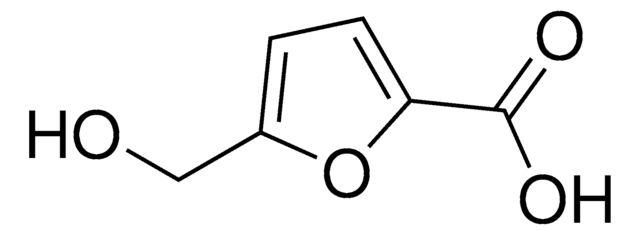53407
5-(Hydroxymethyl)furfural
analytical standard
Synonym(s):
5-Hydroxymethyl-2-furaldehyde, 5-(Hydroxymethyl)furfural, 5-Hydroxymethyl-2-furancarboxaldehyde, HMF
About This Item
Recommended Products
grade
analytical standard
Quality Level
Assay
≥98.0% (GC/HPLC)
shelf life
limited shelf life, expiry date on the label
technique(s)
HPLC: suitable
gas chromatography (GC): suitable
refractive index
n20/D 1.562 (lit.)
bp
114-116 °C/1 mmHg (lit.)
mp
28-34 °C (lit.)
28-34 °C (lit.)
density
1.243 g/mL at 25 °C (lit.)
application(s)
cleaning products
cosmetics
flavors and fragrances
food and beverages
personal care
format
neat
storage temp.
2-8°C
SMILES string
[H]C(=O)c1ccc(CO)o1
InChI
1S/C6H6O3/c7-3-5-1-2-6(4-8)9-5/h1-3,8H,4H2
InChI key
NOEGNKMFWQHSLB-UHFFFAOYSA-N
Looking for similar products? Visit Product Comparison Guide
General description
Application
Packaging
Signal Word
Warning
Hazard Statements
Precautionary Statements
Hazard Classifications
Eye Irrit. 2 - Skin Irrit. 2
Storage Class Code
11 - Combustible Solids
WGK
WGK 2
Flash Point(F)
174.2 °F - closed cup
Flash Point(C)
79 °C - closed cup
Choose from one of the most recent versions:
Already Own This Product?
Find documentation for the products that you have recently purchased in the Document Library.
Customers Also Viewed
Our team of scientists has experience in all areas of research including Life Science, Material Science, Chemical Synthesis, Chromatography, Analytical and many others.
Contact Technical Service











